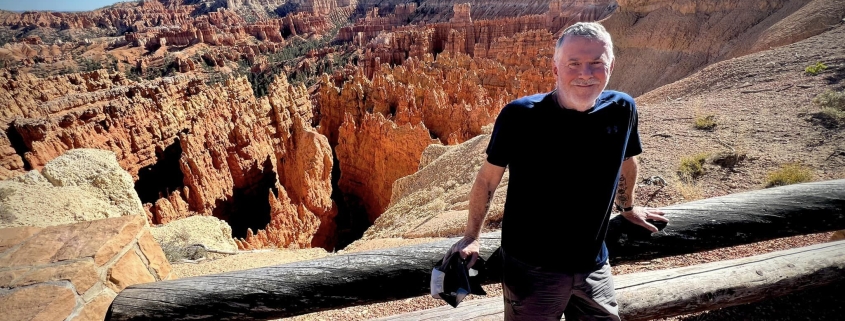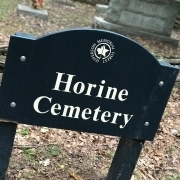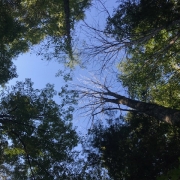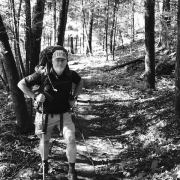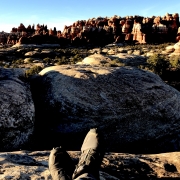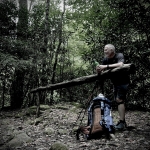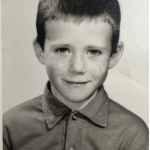An Interlude: What a Fox and a Horse have to Say About Agism | Healthy Aging Series: Season 9, Episode 11
Look in the mirror. What do you see?
You might see your mother or father. I do.
I try remembering when my father was my age. My father was 30 years older than me, so I was 37 when he was 67, the age that I am now. That was 1993. I had moved to Louisville the year before and had started seminary to work on a social work degree.
My father was still working, like me today.
His body was starting to fail him, almost all due to smoking. He would hit 70 a few years later and face several operations and procedures that included heart bypass, colon cancer surgery, and the replacement of his aortal-femoral artery.
These were difficult times for him. I can only imagine.
It was at this time that he was diagnosed with emphysema, which would lead to COPD, and eventually take his life at 82 years old. I’m certain he was demoralized when he received that diagnosis. That’s what aging can do.
You are not the person you were 20 or 30 years ago. You become so much more aware of your mortality. And you begin to lose your sense of value, your sense of worth.
It doesn’t help that we live in an economic system that values productivity, and success, and capital, of which we have a little when we age.
I want you to take a few minutes and read a fairytale about a horse and a fox. It’s short. It’ll take 1 to 2 minutes.
The Fox and the Horse
A peasant had a faithful horse which had grown old and could do no more work, so his master no longer wanted to give him anything to eat and said, “I can certainly make no more use of you, but still, I mean well by you, and if you prove yourself still strong enough to bring me a lion here, I will maintain you. But for now, get out of my stable.” And with that he chased him into the open field.
The horse was sad and went to the forest to seek a little protection there from the weather. There the fox met him and said, “Why do you hang your head so, and go about all alone?”
“Alas,” replied the horse, “greed and loyalty do not dwell together in one house. My master has forgotten what services I have performed for him for so many years, and because I can no longer plow well, he will give me no more food, and has driven me out.”
“Without giving you a chance?” asked the fox.
“The chance was a bad one. He said, if I were still strong enough to bring him a lion, he would keep me, but he well knows that I cannot do that.”
The fox said, “I will help you. Just lie down, stretch out as if you were dead, and do not stir.”
The horse did what the fox asked, and then the fox went to the lion, who had his den not far off, and said, “A dead horse is lying out there. Just come with me, and you can have a rich meal.”
The lion went with him, and when they were both standing by the horse the fox said, “After all, it is not very comfortable for you here — I tell you what — I will fasten it to you by the tail, and then you can drag it into your cave and eat it in peace.”
This advice pleased the lion. He positioned himself, and in order that the fox might tie the horse fast to him, he kept completely quiet. But the fox tied the lion’s legs together with the horse’s tail, and twisted and fastened everything so well and so strongly that no amount of strength could pull it loose. When he had finished his work, he tapped the horse on the shoulder and said, “Pull, white horse, pull!”
Then up sprang the horse at once and pulled the lion away with him. The lion began to roar so that all the birds in the forest flew up in terror, but the horse let him roar, and drew him and dragged him across the field to his master’s door. When the master saw the lion, he was of a better mind, and said to the horse, “You shall stay with me and fare well.” And he gave him plenty to eat until he died.
What are the lessons that we can learn about aging from this fairy tale?
1. We tend to see ourselves, the way our culture sees us. And then we reinforce that by becoming the very thing that our culture sees. The poor farmer didn’t see value in the aged horse. The horse was no longer strong, and he was no longer able to plow the fields, pull the wagon full of grain, or carry supplies from town. In the farmers mind, the horse was worthless, a drag on his economy. And so, the horse withdraws from the land of productivity and enters the forest in his despair.
The horse saw itself as worthless. We become the vision that the world projects onto us. That’s how agism works. It’s like parent projection in a way. Parents project out to their children the wants and dreams they have for them. A doctor, a lawyer, a teacher, a mechanic, you get my point. Society projects onto us, those of us that are aging, a vision that we are tired, that we are a burden, and that we can barely expressive a cogent thought. That’s agism.
And then we believe that vision. We succumb to our own ageism, much like the aged horse.
2. The horse goes into the forest.
In the Jungian interpretation of fairytales, going into the forest often symbolized going into the unconscious. It’s in the forest that the horse hears a voice. It’s the still small voice of the fox that saves him. It offers the countercultural solution of agism: wisdom and cleverness.
Foxes symbolize many things in fairytales. Foxes symbolize overcoming obstacles, solving problems, or outsmarting opponents. The fox is the still small voice that advocates for us. The fox was the voice that helped the horse find its value and it’s worth in the face of despair.
The message from the still small voice is this: You are more than your body.
Think about that for a minute. We are more, much more than our body. We are powerful, much more powerful than the strongest foes, even the lions in our life. I remember being a supervisor 35 years ago at UPS. I was responsible for loading aircraft in the middle of the night. This involved sometimes loading 75- or 85-pound boxes into the belly of a DC 10. I often supervised women who had a difficult time picking up boxes that weighed that much. I would train them and remind them that they have the great equalizer. We understood that men typically were stronger than them, but they could use their brain, which was that equalizer, and ask for help.
There is another fairytale about a fox in some geese. The fox came upon a flock of geese and announced that he was going to eat them one at a time. In that fairytale the fox is outsmarted by the geese because one of the geese was not disheartened, and came up with a plan to pray without ceasing, which put off being eaten even until now!
The message is, do not become disheartened, you have within yourself the strength needed to overcome the frailties of old age.
The truth is, you will begin to fade physically. You will become frail. You will lose outer strength.
But what is also true is you have an inner strength, an inner wisdom, and an inner cleverness that makes you valuable and gives you worth in a society that struggles to know what to do with you.
When you look in the mirror, look past the thinning gray hair, and past the crow’s feet, and past the sunspots, and see the real you. See the person who is much more than a body and see the lion slayer or at least the lion tamer.
Look into the mirror and see into those blue or brown or gray eyes, deep into the inner you and see the fox. Listen the clever, adaptable, and cunning you that lives deep within your unconscious, and listen to that inner voice. That’s what will allow you to fare well in a society that struggles to see your worth.
We have some choices in life. On the one hand, we are aging, getting older, and losing our strength. On the other hand, we can choose not to see ourselves the way society sees us, but see ourselves as having an inner strength that is able to conquer even our greatest foes in times of trouble.
To read more entries in the Healthy Aging series, click here.

